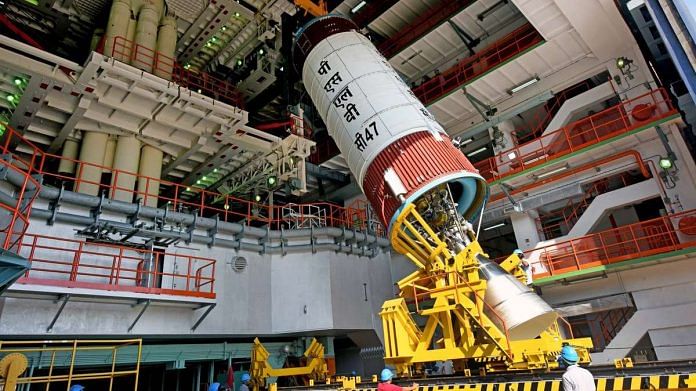Berlin: In an effort to support economic growth in the aftermath of the Covid-19 impact, the government announced reforms to encourage the private sector in space activities. This is indeed a welcome step since the government is thinking on the lines of instituting reforms that can benefit more investment and economic activity in a niche sector.
The reforms announced seem to be mostly focussed on enabling access to existing infrastructure as well providing access to satellite imagery.
Quick review of the reforms
The government has moved to provide the private sector access to existing facilities of the Indian Space Research Organisation (ISRO). This will allow companies to leverage existing expensive infrastructure without the cost of setting it up. This is indeed a great first step.
However, ISRO’s mission manifest itself remains one of the busiest and its facilities are often occupied to meet that demand. It might make sense for startups conducting tests of their CubeSats (miniature satellites) or accessing the launch pads. Currently, a large part of the private sector is dependent on ISRO for its economic activity.
As far as imagery is concerned, ISRO provides some limited access to its database through Bhuvan, an open map-based archive. However, there is a large scope to provide seamless access to imagery on the lines of what the European Space Agency (ESA) does with ‘Copernicus’, the European Union’s Earth observation programme, and allow Indian technology entrepreneurs to leverage Indian space assets to build services on top.
For example, Numer8, a company that does predictive data analysis, is using Copernicus data to provide services to the fishing community to increase their catch, improve their safety and access to the market.
This again is an encouraging announcement. We will have to wait and see how this is established in practice — will the access to imagery be fresh, with almost no latency, free and open on the lines of ESA’s Copernicus or if there will be a cost to acquire imagery products.
Also read: ISRO earned Rs 1,245 cr in 5 years by launching commercial satellites of 26 countries
Provide platform for risk taking
The government should realise that space can be a sector that can parallel the success of other sectors such as information technology or biotechnology.
There are two major steps needed to be taken to create such a foundation for the private sector. The first is to change the basis of engagement of the private sector, from being dependent on ISRO contracts to conducting business independently.
This can happen by encouraging the private sector to mature to become full satellite integrators and service providers in established parts of the value chain, such as Direct-To-Home (DTH) television.
Currently, ISRO routinely builds satellites that provide transponders to DTH operators but also uses foreign transponders to meet the demand. By allowing access to its satellite technology, facilities and orbital slots, ISRO can help the private sector gain both local and Foreign Direct Investment (FDI) to cater to the demands of DTH operators. This will allow ISRO to focus on interplanetary missions and other important long term aspects such as technology development.
As far as startups are concerned, changing the process so they can acquire new products and services from ISRO is necessary to help them attract investments. Such practices are common in the US, which encourages various bodies like NASA and the Defense Advanced Research Projects Agency (DARPA) to work with startups.
Also read: ISRO has a data mine that can help save lives. More people should have access to it
Establishing an independent regulatory environment
Space activities are multi-layered projects which involve a lot of intricacies across domains, such as gaining access to frequencies, licensing of satellites for operation, ability to export products, imagery, etc.
Under the UN’s Outer Space treaty, which governs the activities of states in the exploration and use of outer space, there are many clauses which necessitate the government to have a mechanism in place to oversee much of the activities in the private sector.
Many of these need multi-departmental coordination within the government. For example, providing seamless access to space frequencies to the private sector to operate satellites and uplink/downlink data will involve coordination between the Department of Space and Department of Telecommunications. Similarly, checking on the kind of imagery products being exported and the imaging of geographical locations at certain resolutions will require coordination with the ministries of home affairs and defence.
All these functions are best achieved by having an independent regulator in the sector who can make sure that the rules of the game are set for actors across the space value chain. This will allow establishing a single point of contact within the government and ensure ease of doing business. This will also encourage local and foreign investment in the sector as well as boost the Prime Minister’s Make in India initiative.
A nodal body will also ensure that there is no conflict of interest between ISRO and the private sector, allowing seamless technology and scientific development by the space agency and economic contributions from companies. The regulator will further see that there’s a constant and consistent review of all activities within the space sector. This will make sure that the pace at which systemic reforms can happen will be both continuous and accelerated.
A regulator also means that the Prime Minister’s Office or the Ministry of Finance will not need to intervene every time a decision needs to be made.
The bottomline is that the government needs to bring about these institutional reforms if it wants to witness real economic dividends from the space sector.
Narayan Prasad is the Chief Operations Officer of satsearch.co and host of the NewSpace India podcast, a bi-weekly talk show that exclusively discusses space activities in India.
Also read: India is a maturing space power, but can rival the US with an independent regulator




Good